 The Top 10 Fastest Animals in the Water
The Top 10 Fastest Animals in the Water
Forget your speedy Cheetahs, these ten sea & ocean creatures will leave it for dust. Or would they? Le’ts find out just how fast the fastest water animals are, this is the speedy world of sea life…
The Top 10 Fastest Animals in the Water

10 – Killer Whale(Fastest Recorded Speed:34 MPH)
Info Source: The killer whale or orca is a toothed whale belonging to the oceanic dolphin family, of which it is the largest member. Killer whales have a diverse diet, although individual populations often specialise in particular types of prey.
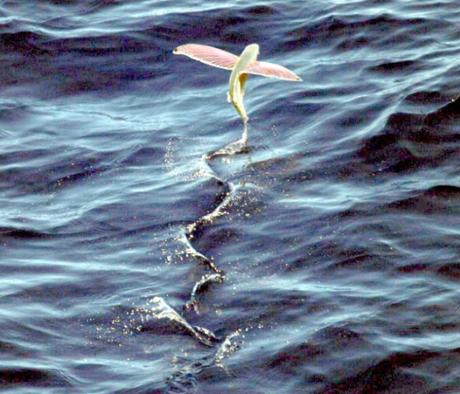
9 – Flying Fish (Fastest Recorded Speed:35 MPH)
Info Source: The Exocoetidae are a family of marine fish in the order Beloniformes class Actinopterygii. Fish of this family are known as flying fish.Flying fish can make powerful, self-propelled leaps out of water into air, where their long, wing-like fins enable gliding flight for considerable distances above the water’s surface.
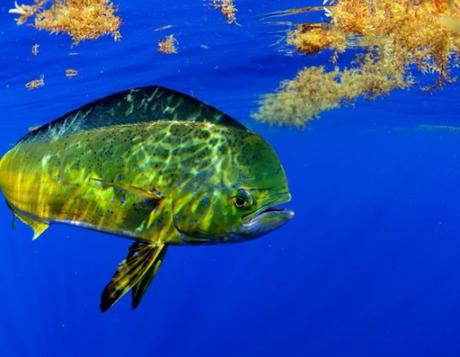
8 – Mahi-Mahi (Fastest Recorded Speed:37 MPH)
Info Source: The mahi-mahi or common dolphinfish is a surface-dwelling ray-finned fish found in off-shore temperate, tropical and subtropical waters worldwide. Also widely called dorado and dolphin, it is one of two members of the Coryphaenidae family, the other being the pompano dolphinfish. Mahi means very strong in Hawaiian.

7 – Bonito (Fastest Recorded Speed:39 MPH)
Info Source: Bonitos are a tribe of medium-sized, ray-finned predatory fish in the family Scombridae – a family it shares with the mackerel, tuna, and Spanish mackerel tribes, and also the butterfly kingfish. Also called the Sardini tribe, it consists of eight species across four genera; three of those four genera are monotypic, having a single species each.
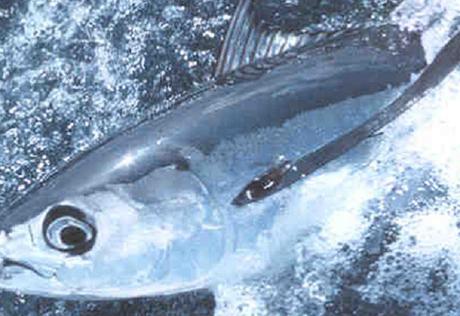
6 – Albacore Tuna (Fastest Recorded Speed:40 MPH)
Info Source: Albacore are pelagic predators that eat a variety of foods, including fish, crustaceans, and cephalopods. They are unique among tuna in that their primary food source is cephalopods, with fish making up a much smaller portion of their diet. Reproduction usually occurs from November to February and is oviparous. An adult female can release over 2 million eggs in a single cycle!
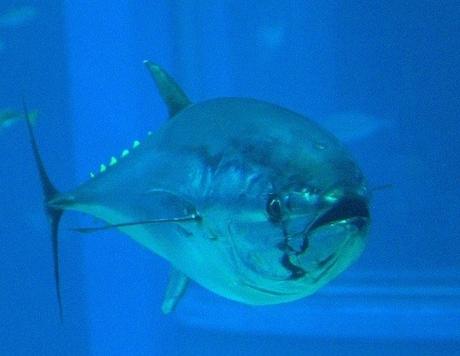
5 – Blue-fin Tuna (Fastest Recorded Speed:45 MPH)
Info Source: Almost all fish are cold-blooded. However, tuna and mackerel sharks are warm-blooded: they can regulate their body temperature. Warm-blooded fish possess organs near their muscles called retia mirabilia that consist of a series of minute parallel veins and arteries that supply and drain the muscles.
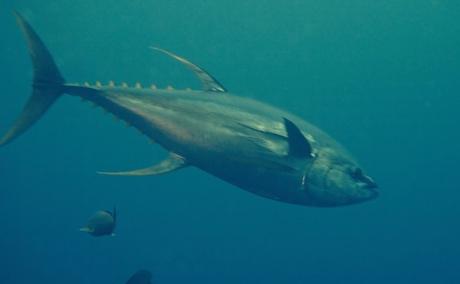
4 – Yellowfin Tuna (Fastest Recorded Speed:49 MPH)
Info Source: Yellowfin is often marketed as ahi, from the Hawaiian ʻahi, a name also used there for the closely related bigeye tuna. The species name, albacares can also lead to confusion: in English, the albacore tuna is a different species, while yellowfin is officially designated albacore in French and referred to as albacora by Portuguese fishermen.
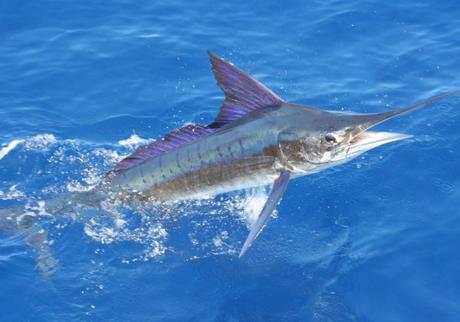
3 – Marlin (Fastest Recorded Speed:50 MPH)
Info Source: A marlin is a fish from the family Istiophoridae, which includes about 10 species. It has an elongated body, a spear-like snout or bill, and a long, rigid dorsal fin which extends forward to form a crest. Its common name is thought to derive from its resemblance to a sailor’s marlinspike.

2 – Swordfish (Fastest Recorded Speed:60 MPH)
Info Source: Swordfish are elongated, round-bodied, and lose all teeth and scales by adulthood. These fish are found widely in tropical and temperate parts of the Atlantic, Pacific, and Indian Oceans, and can typically be found from near the surface to a depth of 550 m.
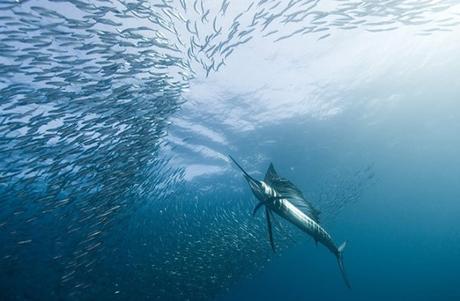
1 – Sailfish (Fastest Recorded Speed:68 MPH)
Info Source: Sailfish are a genus Istiophorus of billfish living in warmer sections of all the oceans of the world. They are predominantly blue to gray in color and have a characteristic erectile dorsal fin known as a sail, which often stretches the entire length of the back. Another notable characteristic is the elongated bill, resembling that of the swordfish and other marlins.

